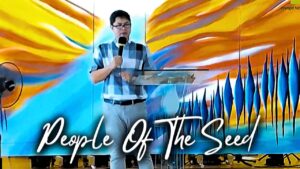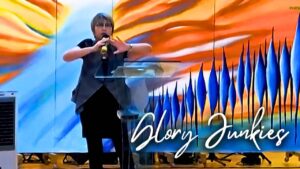Title: A voice, A mirror, and A faith
Scripture Reading: John 1:23, Acts 6:15; 7:55-56, Matthew 14:28
He said, “I am the voice of one crying in the wilderness”
And all that sat in the council, looking steadfastly on him, saw his face as it had been the face of an angel.
“But he, being full of the Holy Ghost, looked up steadfastly into heaven, and saw the glory of God, and Jesus standing on the right hand of God and said, Behold, I see the heavens opened, and the Son of man standing on the right hand of God.”
But Peter left the ship, a very bold step of faith. One glimpse of his Savior was enough. He cried out, “If it be thou… bid me come to thee … on the water..!”
There are three great truths in the three portions of scriptures:
John the Baptist – A voice
Stephen – A mirror
Peter – A bold step of faith.
- John, A Voice
John showed us the kind of service most pleasing to the Lord.
Scripture says he ‘was the greatest among them that are born of women.’
He said, ‘I am the voice of one crying in the wilderness.’
He considered himself unworthy to even touch his master’s shoes.
The phrase ‘a voice in the wilderness’ first appeared in Isaiah 40:3 and then quoted in all four Gospels.
John sees himself as just a messenger, a voice, to prepare for the coming of the Messiah.
The wilderness is dry, harsh and unable to give lasting life. The wilderness points to spiritual barrenness and extreme distance from God. The world today is a wilderness. The world today is a life apart from God. The wilderness is a place of spiritual barrenness. Deserts symbolize lifelessness and human inability. The wilderness is also a place of loneliness and struggle.
Jesus was tempted in the wilderness for 40 days. 40 represents a generation.
Today, there are bitter cries in the wilderness and John became that voice who heard the cry in the wilderness.
What a powerful rebuke to us in this age of self-occupation, promotion of personalities, influence-grabbing, ego-tripping, and seeking of honors.
How many who are in the limelight today are prepared to lose their following – to be set aside and out of sight – to no longer be the center of things – to be placed on a path of decreasing popularity and usefulness?
The secret of John’s happiness was his joy not in his ministry or his work, not his personal usefulness or widespread influence. His pure joy was to stand in the presence of the bridegroom, hear his voice and rejoice in it.
The real need is for humble, unknown, unheralded voices. Voices that testify to a doubting world that Christ is enough to see everyone through any crisis. That Christ is a tower of strength.
Today like John the Baptist, we can be a voice in the wilderness.
A. Speaks God’s truth clearly.
B. Share scripture in daily conversations with friends and family.
C. Live simply.
D. Help people see their need for Christ.
- Stephen, a mirror.
And all that sat in the council, looking steadfastly on him, saw his face as it had been the face of an angel.
“But he, being full of the Holy Ghost, looked up steadfastly into heaven, and saw the glory of God, and Jesus standing on the right hand of God and said, Behold, I see the heavens opened, and the Son of man standing on the right hand of God” (Acts 7:55-56).
Stephen mirrored the face of God.
He is one who mirrors that glory in such a way that all who see it will be amazed and filled with wonder.
Look at the hopeless condition Stephen found himself in. He was surrounded by religious madness, superstition, prejudice, and jealousy. The angry crowd pressed in on him, wild-eyed and bloodthirsty. Death loomed just ahead of him. What impossible circumstances. But looking up into heaven he beheld his Lord in glory, and suddenly his rejection here on earth meant nothing to him. Now he was above it all, as seeing Him who was invisible.
The idea is that the Christian reflects, like a mirror, the glory on which he gazes continually. It is we who are “in the glass” – a mirror – looking on Christ, the object of our affection and becoming like Him in the process of beholding.
We do not change ourselves – the revelation of Christ changes us.
When the pangs of trial seize us,
When the waves of sorrow roll,
I will lay my head on Jesus —
Pillow of the troubled soul:
Surely none can feel like thee,
Weeping one of Bethany!
“Jesus wept!” — that tear of sorrow
Is a legacy of love.
Yesterday, today, tomorrow,
He the same doth ever prove.
Thou art all in all to me,
Living one of Bethany!
- Peter, a bold step of faith.
It is one thing to have the Lord come to us in our trials and circumstances to calm our troubled souls and hush our fears – but it is something altogether different to step out in the midst of turmoil and go after Him. The disciples who stayed in the boat were no doubt thinking, “It is enough to have Him nearby and to know He cares for us in this storm. Let’s just sit still and wait till He comes to us.” But Peter left the ship, a very bold step of faith. One glimpse of his Savior was enough. He cried out, “If it be thou… bid me come to thee … on the water..!” (Matt. 14:28).
The key to this important lesson is, “come unto thee… on the water…” Jesus said “Come.”
But many times, when it comes to trials or events, it calls for the bold step of faith.
The truth is that Peter did walk on the water. By faith he had discovered a place in Christ above the stormy, raging sea. He was walking over what threatened him. The storm kept the waters boiling – Peter did not walk on a sea of glass. Yet he did walk on or above the turmoil; that is the real lesson. Jesus only needed Jesus to fix his gaze on Jesus.
Today, we have a greater John the Baptist, a greater Stephen, a greater Peter. What kept our Lord above all the circumstances in His life? Jesus wept, He hungered, He hurt, the sun burned Him, He grew weary, He was like any other man in the natural who is affected by conditions. Yet He was always above it all – because He was never doing His own work or fulfilling His own will. He did God’s will perfectly – He was totally dependent on His Father – His eye was fixed only on the glory of His Father. It was that focused “single eye” that was His secret of victory in every crisis. Yet he had to seemly fail because of each and everyone of us. In His worst crisis, he was crucified. Instead of rest, he was so troubled at the Garden of Gethsemane that he prayed in deep anguish but God did not answer his request. Why? Because of us. He had to die for our sins. He had to be crucified so that when He is risen, we would be victorious in all things, when we believed in him. God did not give Jesus a way of escape because of us. Jan would not have that scholarly without Jesus. We would not have moved to this building without Jesus. It is only possible because of Jesus’s death that makes victory possible. But we can only claim victory by bold steps of faith. Jesus said, we can do greater things because Christ has already died at the Cross and he gone to the Father in heaven and given us the Holy Spirit, that we can do all things through Christ that strengthen us.





